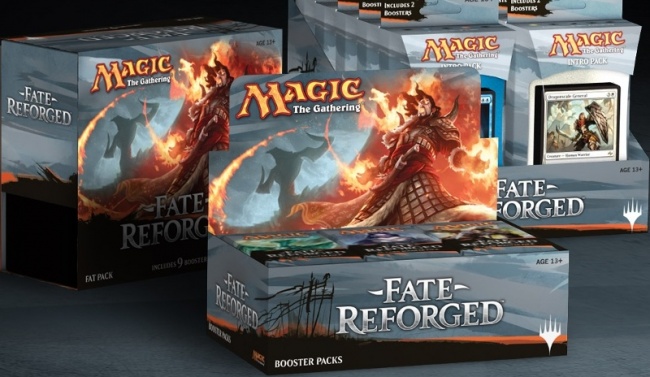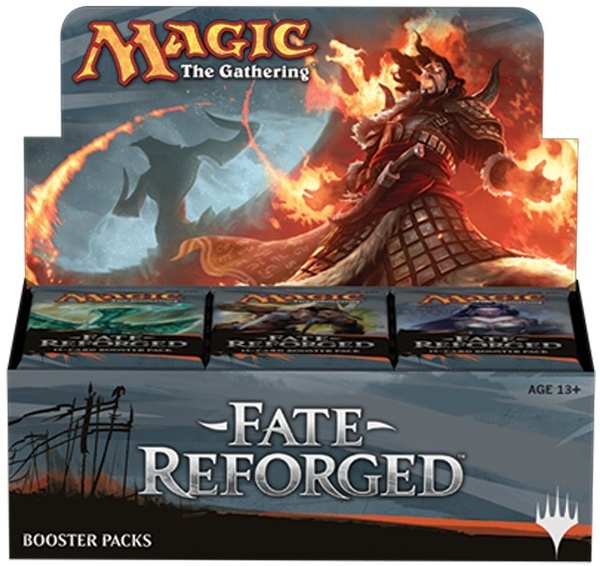Rolling for Initiative is a weekly column by Scott Thorne, PhD, owner of Castle Perilous Games & Books in Carbondale, Illinois and instructor in marketing at Southeast Missouri State University. This week, Thorne takes on the issue of mass merchants breaking street dates.
ICv2 ran a story last Friday on the early release of Magic: The Gathering--Fate Reforged by a Target in Anchorage, Alaska. A somewhat misleading headline read "Target Store Says 'Magic' Release Dates Don't Apply." If you read the article, and of course a lot of retailers did, generating discussion of petitions and boycotts, what actually happened demonstrates what generally happens with product like Magic and Pokemon and Yu-Gi-Oh! and baseball cards and football cards and other stuff that Target and other big box stores do not want to mess with. When the owner of BOSCO's asked the Target manager on duty about it, she said told him that it was not Target's issue since they get it from their vendor Excell. She knew nothing about the product, it scanned through her registers, ergo it must be OK to sell.
Excell is what is called a rack jobber. Much like with Frito Lay, Little Debbie snack cakes and assorted cigarette manufacturers, Target does not actually stock the racks of trading card games and sports cards in their stores. There is a lot of product with which to deal and Target knows customers come in looking for it but Target also does not really want to mess with it. Nor do Walmart, K-mart or any other mass market discounter. Instead, the store turns the product line over to a specific manufacturer or distributor, known in the trade as a "jobber" or "rack jobber." The store assigns a specific section of shelf space to the jobber and it now becomes the jobber’s responsibility to generate sufficient levels of sales and profits to justify getting that shelf space in the store. The jobber keeps very close track of what they stock in their space, wanting to produce as much inventory turnover (I will talk about inventory turnover and why it is important some other time) and hence profit as possible.
Since it is their livelihood, the jobber is also very protective of their space. When I worked for Walmart a number of years ago, we would occasionally find bags of chips lying on the floor in the snack food aisle. Someone would stock another company's chips in the Frito Lay section and the Frito jobber would clear them out of their space. They paid for the space and they wanted their products in it.
Ultimately, when street dates are broken, as in the case here, typically it is Excell's or a similar company's fault, not Target or Walmart. The mass merchant assumes that the jobber knows its product line and when it can go on sale and acts accordingly. When contacted about a broken street date, the distributor will usually act to pull the product from the shelves until it can go on sale. Unfortunately, however, once a street date gets broken, no-one at the offending store particularly cares since TCGs make up such a tiny part of their sales, meaning the LGS's customers can buy all they want until an injured party, typically the Local Game Store, takes action. Until that happens, the LGS, who also has to compete with the mass merchant in other areas such as price, sees a significant portion of new release sales flowing into the mass merchant’s registers.
And the most galling thing? Breaking a street date brings a comparatively tiny percentage of increased sales to the mass merchant, significant loss of sales to the LGS, and no apparent repercussions from the publisher time after time. Stores keep hearing the publishers will take action against broken street dates, but the only place that ever appears to suffer repercussions from breaking a street date is the LGS.
The opinions expressed in this column are solely those of the writer, and do not necessarily reflect the views of the editorial staff of ICv2.com.

Column by Scott Thorne
Posted by ICv2 on January 26, 2015 @ 12:09 am CT



